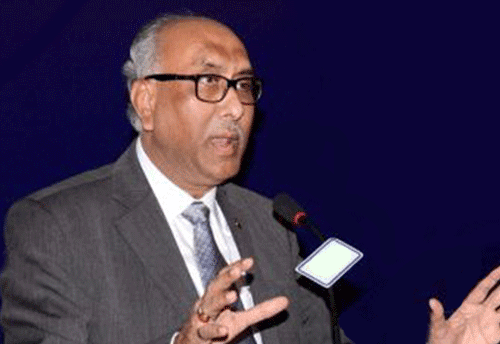Enhancing financial capability of MSEs would help them move away from informal sources of finance: Mundra
Updated: Sep 24, 2016 06:26:08am

Enhancing financial capability of MSEs would help them move away from informal sources of finance: Mundra
Mumbai, Sep 24 (KNN) Micro and small entities are typically enterprises with little or no credit histories and with inadequate expertise in preparing financial statements etc, said S. S. Mundra, Deputy Governor, RBI.
While addressing at the BRICS Workshop on Financial Inclusion here recently, Mundra said, “Financial Inclusion is the process of ensuring access to appropriate financial products and services needed by all sections of the society in general and vulnerable groups such as weaker sections and low income groups in particular at an affordable cost in a fair and transparent manner by mainstream institutional players”.
For improving credit absorption capacity, Mundra spoke of three section approaches - i) the small and marginal farmers, share croppers, ii)micro and small industries and iii) the low salary earners in the unorganized sectors.
“Collectively, this section makes a significant part of the population that needs enhancement in their financial capabilities. Also, these sections are extremely important contributors to the country’s GDP and labour force,” he said.
Mundra said enhancing financial capability of mainly the micro and small entrepreneurs from amongst the larger MSME fold would help these entrepreneurs to move away from the informal to the formal sources of finance.
“Micro and small entities are typically enterprises with little or no credit histories and with inadequate expertise in preparing financial statements etc. They would, hence, need to be served with relevant products and at low cost by employing innovative credit scoring models,” the RBI Deputy Governor said.
He also pressed upon the need to scale up the skills of the low salary earners in the unorganized sector through training inputs. Integrating the skill development initiatives with secondary and intermediate level education would address the challenge of low education levels and also provide school dropouts with employability skills.
“Dearth of formal vocational education, high school dropout rates, inadequate skill training capacity, negative perception towards skilling, lack of industry ready skills even in professional courses, continue to stand out as some of the major causes of poor skill levels in the workforce. It is heartening to note Government’s commitment in encouraging entrepreneurship in the country through the new national skill development mission,” said the expert.
RBI has granted in-principle approval to some entities to set up differentiated banks namely “Small Finance Banks” (SFBs) and “Payments Banks” to further the cause of financial inclusion in the country.
Other than serving as vehicles for savings, SFBs and Payments banks are expected to enhance the supply of credit to small business units, small and marginal farmers, micro and small industries and other entities in the unorganized sector and enable provisions for cost-efficient remittance services in a secured technology driven environment respectively. (KNN Bureau)











